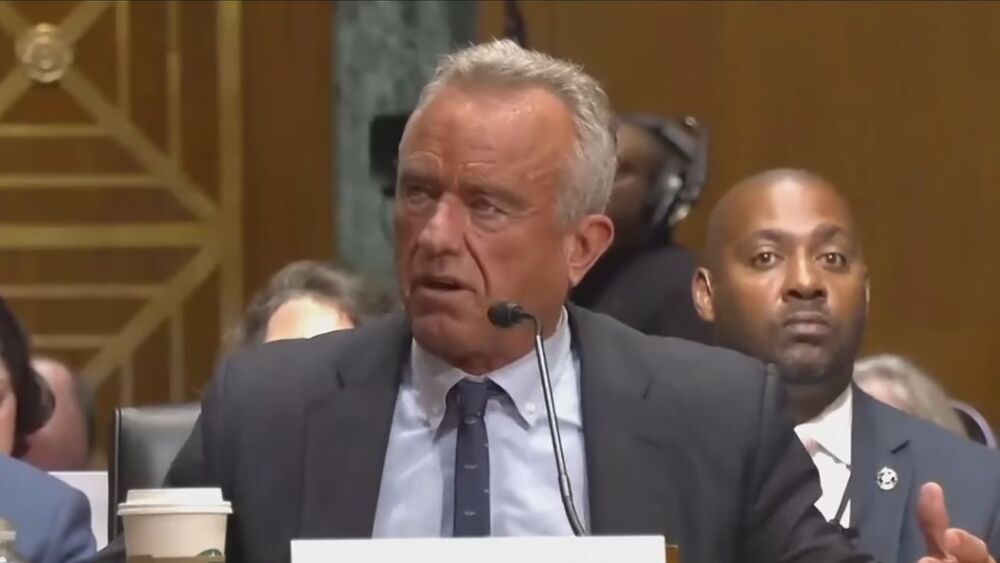Robert F. Kennedy Jr. repeated a series of anti-vaccine talking points during his appearance in front of the Senate finance committee on Thursday, as Democratic and Republican senators alike hammered the Health Secretary on recent COVID-19 vaccine restrictions and his views on Operation Warp Speed.
Robert F. Kennedy Jr.’s testimony in front of the Senate finance committee on Thursday often rose to the level of shouting, as senators from both sides of the aisle accused the country’s health secretary of reneging on promises he had made during his confirmation hearings to maintain access to vaccines.
The hearing came a week after the FDA granted restricted approvals for COVID-19 vaccines developed by Pfizer/BioNTech, Moderna and Novavax for adults 65 and older and younger people at elevated risk of severe disease. This has thrown the country into considerable confusion, with CVS announcing Monday that it will not offer COVID-19 shots in 16 states. During her allotted time at Thursday’s meeting, Sen. Elizabeth Warren (D-MA) went around in circles with Kennedy on the question of access.
“There was clearly deep unhappiness with the secretary’s responses, from senators on both sides of the aisle for going back on his word,” Dorit Reiss, professor of law at UC Law San Francisco, told BioSpace.
During the hearing, Kennedy repeatedly stated that COVID-19 vaccines were harmful or hadn’t been adequately tested, which raised objections from several senators on the committee.
“We were lied to,” Kennedy alleged at one point about the effectiveness of mRNA-based COVID-19 vaccines that were developed under Operation Warp Speed during President Donald Trump’s first term. Without providing evidence, the secretary said that the vaccines’ effectiveness was only tested in animals.
The safety and efficacy of both Pfizer/BioNTech’s and Moderna’s vaccines were tested in human clinical trials.
“I’m a doctor. Vaccines work,” Sen. John Barrasso (R-WY) said during the hearing.
Kennedy pushed back on accusations levied by several senators that he is anti-vaccine. “Saying I’m anti-vaccine is like saying I’m anti-medicine,” he said Thursday, according to NPR. “It doesn’t mean that I’m, you know, anti-vax. It just means I’m pro-science.”
Reiss wasn’t sold. “In spite of saying he’s not, he’s clearly anti-vaccine,” she said, adding that Kennedy repeated several anti-vaccine talking points, including claiming that COVID-19 vaccines carry substantial risks and death rates and that they have not been adequately studied. “All this is untrue, are anti-vaccine tropes and are ill-founded.”
Thursday’s hearing followed a series of high-profile shake-ups at the CDC, including the firing of newly confirmed director Susan Monarez and the resignation of three other high-ranking regulators. In an op-ed Thursday in The Wall Street Journal, Monarez alleged that she was fired for refusing to pre-approve recommendations made by the CDC’s Advisory Committee on Immunization Practices. Presented with the editorial during the hearing, Kennedy refuted Monarez’s claims, saying she was lying.
Political Theater
“As political theater goes, it was a great hearing,” Steven Grossman, policy analyst and author of the FDA Matters blog, told BioSpace. “It turned heavily on Kennedy’s stubborn self-assurance and unwillingness to depart even an iota from his well-rehearsed script. As a rule, actual shouting matches are rare, but there were several.”
A notable example occurred when Kennedy stated that medical associations that have pushed back against his policies, like the American Heart Association, are corrupt or in debt to the pharmaceutical industry. Sen. Bernie Sanders (I-VT), voice raised, said that Kennedy essentially believed anyone who opposed him was corrupt.
Kennedy has been under increasing pressure from Sanders and others since Monarez’s firing. A group of former CDC directors and acting directors have levied heavy criticism on the secretary, while Sanders called for his firing in an editorial published Aug. 30 in The New York Times. The largest voice came in the form of an open letter, published this week, from over 1,000 current and former Health and Human Services employees, also calling for Kennedy to resign.
“Typically, federal employees are very quiet about anything political. They don’t comment,” Paul Offit, director of the Vaccine Education Center at the Children’s Hospital of Philadelphia, told BioSpace. “It tells you how angry people are right now, and it also tells you that the Trump administration is missing this, because the people like vaccines. Most parents embrace vaccines.”
Whether Kennedy might meet his end at HHS anytime soon is unclear. Reiss speculated that part of the political theater to which Grossman referred was an attempt to influence the president’s thinking on this matter.
“Several Republican senators mentioned Operation Warp Speed, and I think that was reminding the president his role in this important operation,” she said—“and maybe to get Trump to fire Kennedy. That’s why they kept bringing it up.”
For Offit, however, theater is pretty much the only takeaway from Thursday’s hearing. “I think that this committee hearing is largely a chance for senators to vent and will accomplish nothing,” he said. Ultimately, he continued, Republican congresspeople need to march into Trump’s office and tell the president that “‘they’re scared they’re going to lose vaccines.’”
“Trump wants to do grand things, and I think he thinks Kennedy can do that.”







